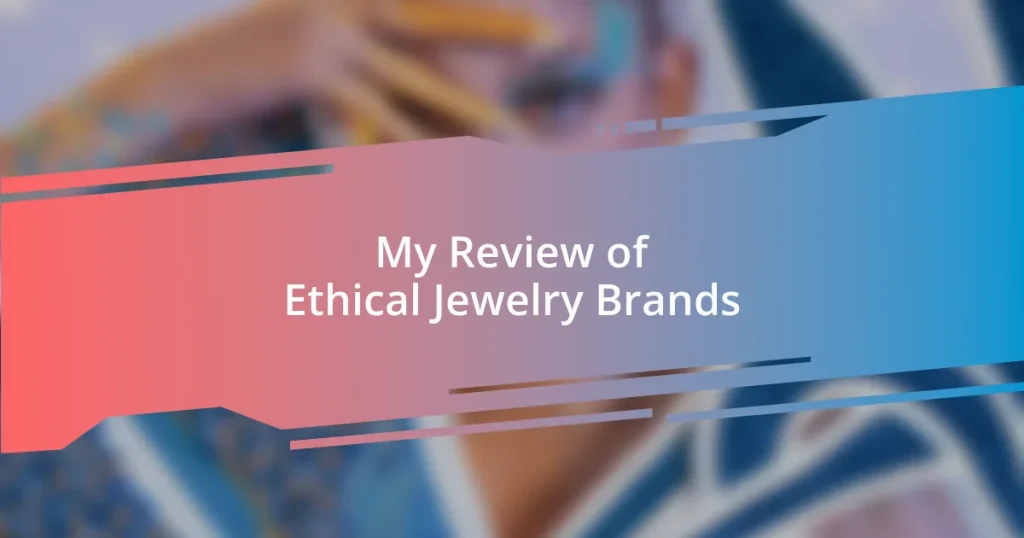Key takeaways:
- Ethical jewelry brands prioritize sustainability, fair labor practices, and responsible sourcing, transforming jewelry purchases into acts of advocacy.
- Consumers should seek transparency and certifications (e.g., Fair Trade, Responsible Jewelry Council) to ensure their jewelry aligns with ethical standards.
- Consumer choices impact the jewelry industry, encouraging brands to adopt more sustainable and ethical practices through increased demand for transparency and storytelling.
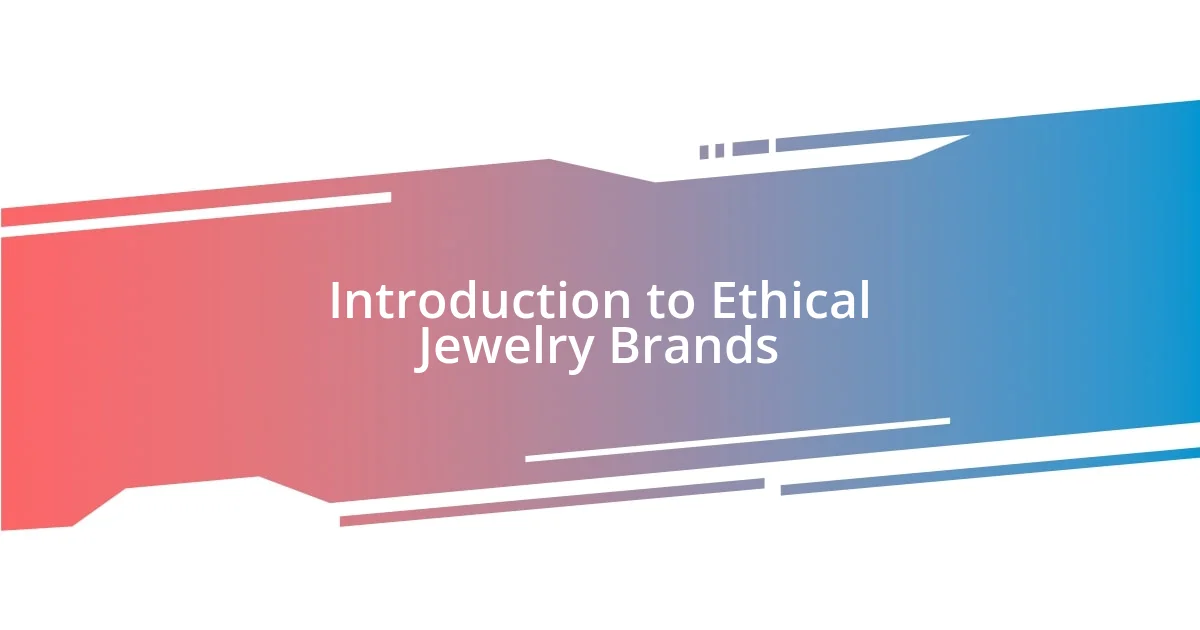
Introduction to Ethical Jewelry Brands
Delving into the world of ethical jewelry brands can be an enlightening experience, particularly as we become more conscious of the choices we make. I still vividly recall the moment I first learned about the impact of mining on communities and the environment. It made me question: how can something as beautiful as jewelry contribute to such harm?
When I discovered ethical jewelry brands, it felt like uncovering a hidden gem. Each piece not only exuded beauty but also carried a story of responsibility and sustainability. For instance, knowing my accessories are crafted from recycled materials or responsibly sourced gemstones adds a layer of meaning beyond mere aesthetics. Isn’t it empowering to wear jewelry that reflects our values?
As I explored various brands, I was struck by how many prioritize fair labor practices and environmental stewardship. It’s not just about adornment; it’s about supporting artisans and safeguarding our planet. This awakening has made my jewelry choices more intentional, allowing me to express myself while aligning with a greater cause. Doesn’t that make every purchase feel like a small act of advocacy?
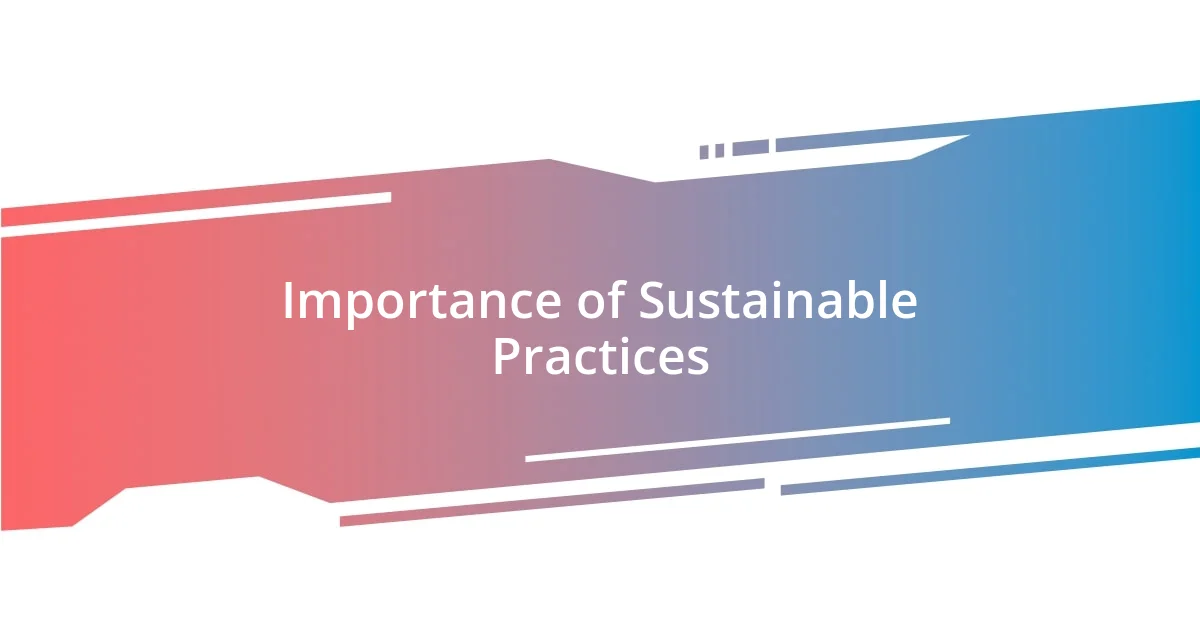
Importance of Sustainable Practices
Sustainable practices in jewelry production are crucial for protecting our planet and its communities. When I learned that responsible sourcing ensures gemstones are obtained without harmful mining practices, it fundamentally changed how I view purchasing jewelry. Each time I choose a piece that prioritizes sustainability, I feel a sense of purpose; it’s like my choices are woven into a broader narrative of environmental respect and social justice.
Additionally, embracing sustainable practices fosters a deep connection between consumers and artisans. For instance, while browsing a local ethical jewelry brand, I met the designer who shared her commitment to fair labor conditions. Hearing her passion reinforced my belief that jewelry can be more than an accessory; it can be a tangible representation of the values we hold dear. It’s powerful to realize that each piece has the potential to uplift lives and promote ethical innovation in the crafting process.
Furthermore, sustainable practices often lead to quality craftsmanship, resulting in timeless pieces that stand the test of trends. I remember investing in a recycled gold necklace, and the satisfaction of knowing I was contributing to a circular economy sparked joy every time I wore it. Choosing sustainable jewelry means investing in items that tell a story—my story—of conscious consumerism and a desire for positive change.
| Traditional Jewelry Practices | Sustainable Practices |
|---|---|
| Often rely on mining which can harm communities and ecosystems | Focus on responsible sourcing and recycling materials |
| May overlook labor conditions | Prioritize fair labor and empower artisans |
| Tends to favor mass production and low cost | Emphasizes quality integrity and lasting beauty |
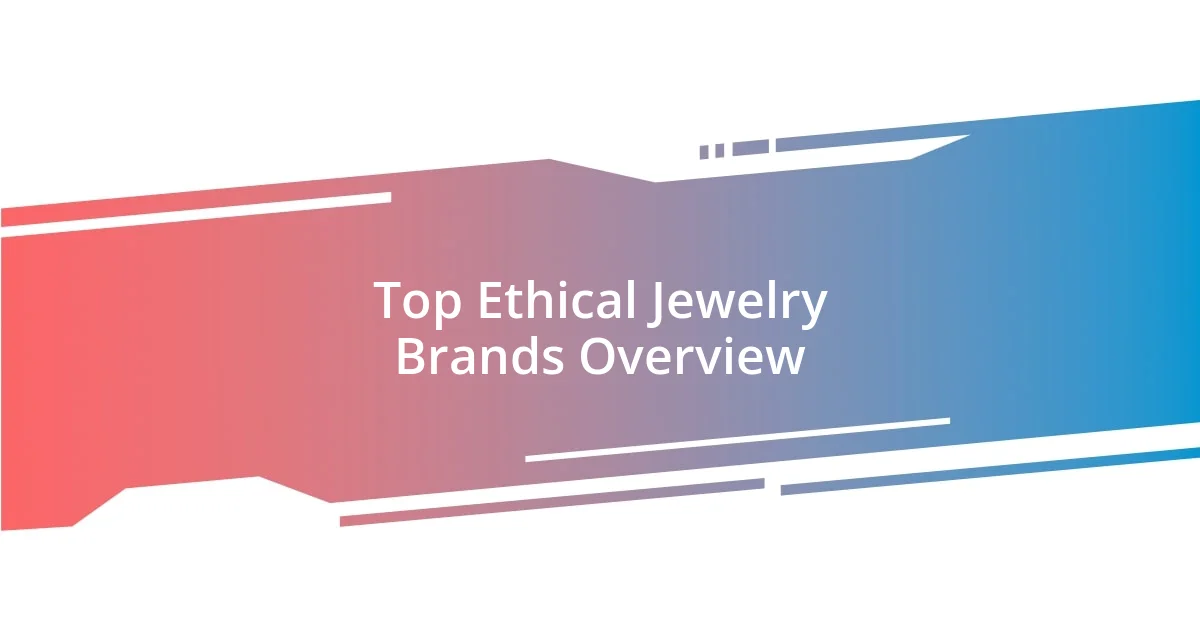
Top Ethical Jewelry Brands Overview
When exploring top ethical jewelry brands, I found that each one has its unique story and commitment to sustainability. For instance, I came across Brilliant Earth, which not only offers beautifully crafted pieces but also ensures conflict-free sourcing. I remember receiving a pair of earrings from them as a gift; knowing they were made from reclaimed materials made wearing them feel extra special. This conscious approach resonates with so many consumers today who want their jewelry to reflect their values, bringing a sense of satisfaction beyond the aesthetics.
Here are some noteworthy ethical jewelry brands that caught my attention:
- Brilliant Earth: Focus on conflict-free gemstones and recycled materials.
- Mejuri: Emphasizes transparency in sourcing and fair pricing.
- Catbird: Rescued metals and ethically sourced stones, supporting local artisans.
- Soko: Unique designs made by artisans in Kenya using sustainable practices.
- Vrai: Lab-grown diamonds that are environmentally friendly.
Each of these brands embodies a commitment to ethical practices, transforming the act of purchasing jewelry into a meaningful experience. It’s remarkable to see how a small change in our buying choices can contribute to a larger impact on the world.
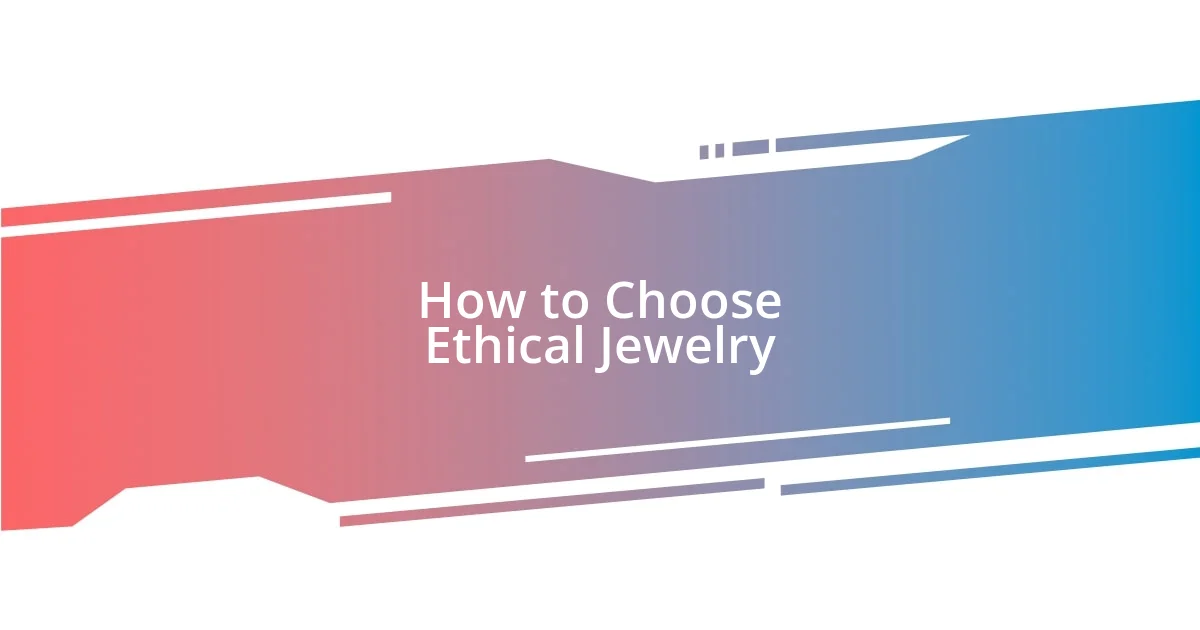
How to Choose Ethical Jewelry
When choosing ethical jewelry, it’s essential to look for transparency. I remember a time when I was uncertain about where my jewelry was coming from, which left me feeling uneasy. Now, I always ask questions about a brand’s sourcing and labor practices; I find that brands willing to share their supply chain story often reflect higher ethical standards.
In my experience, supporting artisans directly can be incredibly rewarding. I once bought a bracelet from a local fair trade market, and meeting the craftsman who made it added so much depth to the piece. The connection I felt turned that simple accessory into a cherished reminder of a rich cultural story and the importance of empowering communities.
Lastly, consider the materials used in the jewelry. I often explore pieces made from recycled metals or lab-grown gems. It’s like wearing a badge of honor for being eco-conscious. When I wear a necklace made from reclaimed silver, I feel connected to the idea that my choice actively reduces waste. Isn’t it uplifting to think that our jewelry can have a positive environmental impact?
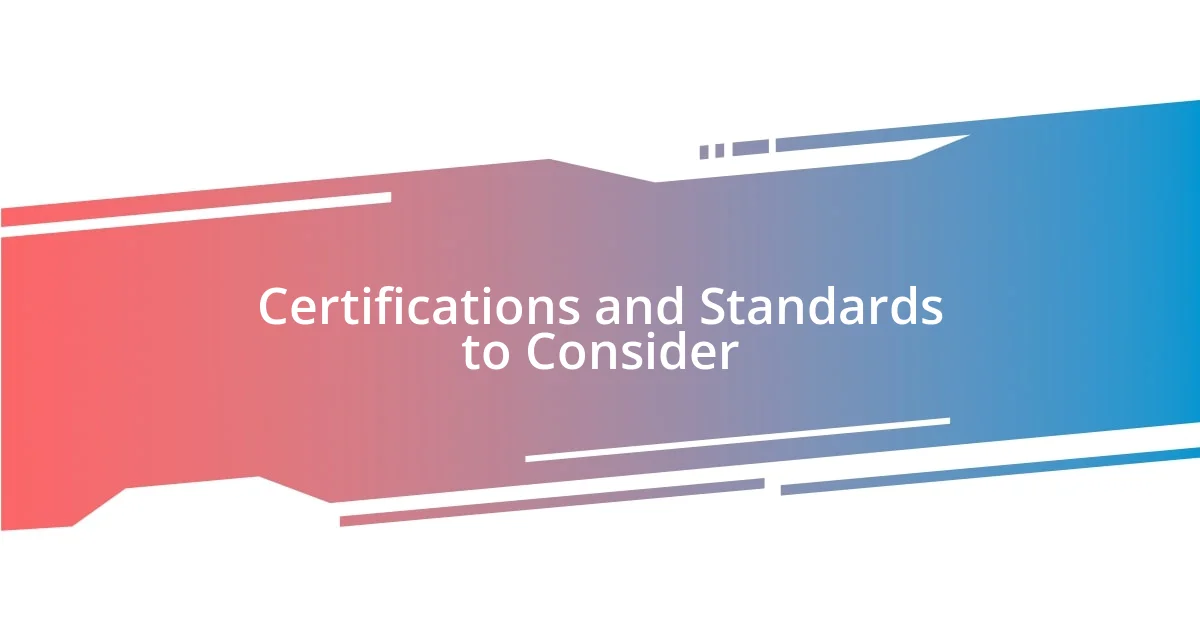
Certifications and Standards to Consider
Certifications and standards play a vital role in identifying truly ethical jewelry brands. I always look for certifications like Fair Trade, which ensures that artisans receive fair wages and that the entire supply chain is ethically managed. One time, I stumbled upon a pair of earrings certified by Fair Trade, and knowing that my purchase supported fair labor practices instantly enhanced my joy in wearing them.
Moreover, consider brands that provide transparency through certifications like the Responsible Jewelry Council (RJC). This certification guarantees that the jewelry has been sourced responsibly and sustainably. It’s comforting to know that my choice is backed by rigorous standards; I recall wearing a ring from an RJC-certified brand and feeling a sense of pride knowing it reflected my values of responsibility and care for the environment.
Lastly, it’s important to check for lab-grown diamonds as they carry their own set of standards. I remember being fascinated by this when I first learned about it; knowing that these gems have a far lesser environmental impact than mined diamonds makes them so appealing. Wouldn’t you agree that choosing jewelry that aligns with ethical practices can be a reflection of our personal beliefs and commitment to a better world?
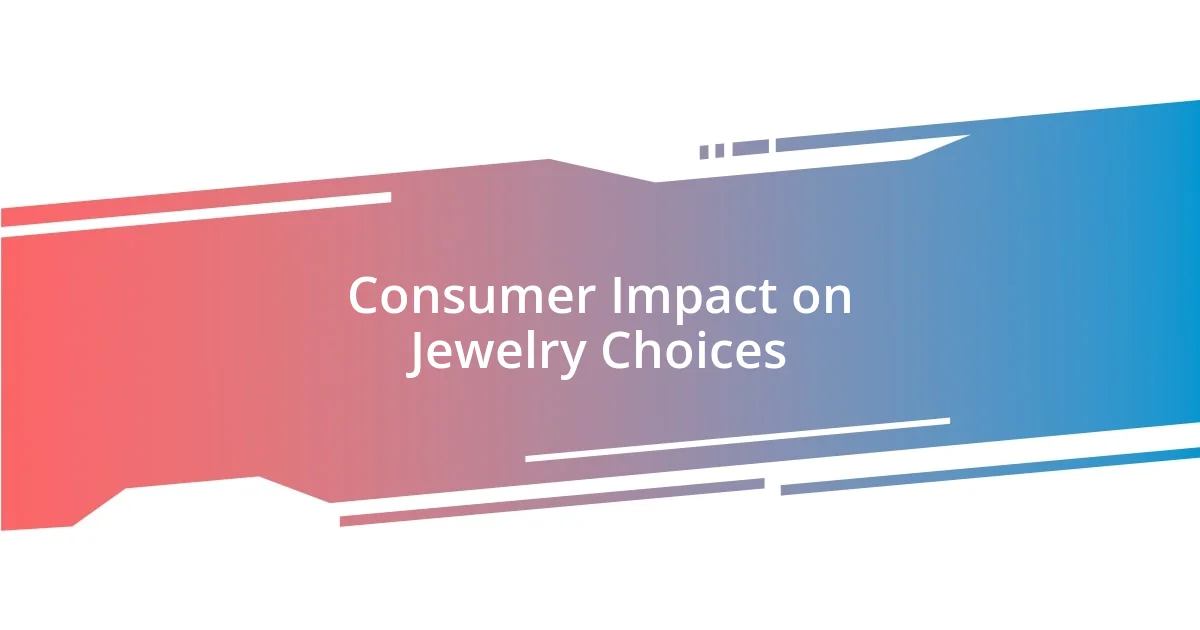
Consumer Impact on Jewelry Choices
The choices we make as consumers can significantly shape the landscape of the jewelry industry. I recall a shopping experience where I hesitated to buy a stunning pair of earrings simply because I couldn’t trace their origins. It’s interesting how a lack of transparency can influence our decisions—having that information can change everything, can’t it? When consumers demand ethically sourced materials, brands often feel the pressure to adapt, leading to a positive shift in the industry.
Moreover, I’ve noticed a growing trend where consumers are prioritizing storytelling behind each piece. I once engaged with a brand that had a storytelling campaign, highlighting the artisans and their craft. It made me think about the labor, passion, and tradition that goes into each jewel. The emotional connection we foster with these stories can transform jewelry from mere adornments into meaningful keepsakes, driving a wish for a more ethical marketplace.
Finally, the environmental impact of our choices resonates deeply with me. One day, I found a beautiful ring made from recycled gold, and the conversation I had with the seller about its origins left a lasting impression. It made me realize that when we choose sustainable options, we’re not just making a purchase—we’re laying groundwork for future generations. Isn’t it fulfilling to think our choices can contribute to a more humane and Earth-friendly world?










